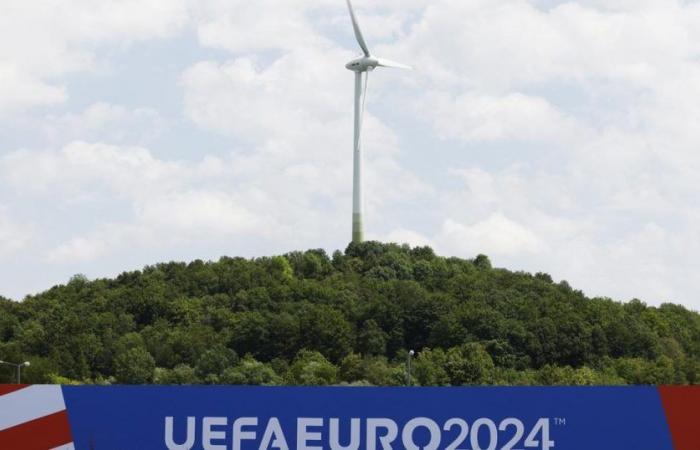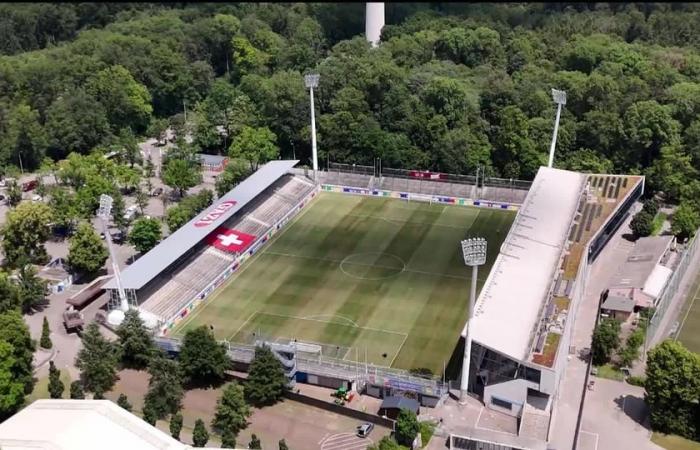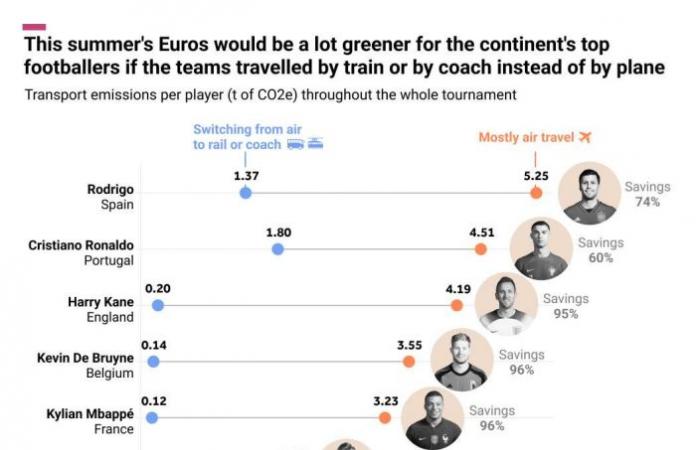With its ambition to become the most sustainable European Football Championship so far, Euro 2024 in Germany had better make an effort. But this requires that players and supporters also be involved, because the carbon footprint of such sporting events is considerable.
After a Euro 2021 in eleven different countries and teams traveling from Azerbaijan to the south of Spain, UEFA wanted this year to return to a more usual European Championship in a single country, Germany, from June 14 to July 14. With the result being a less controversial competition in terms of global warming.
Germany has enough football stadiums to accommodate many fans and they can travel from one city to another within a reasonable distance. And the German railway network is dense and modern, making it easier for fans to travel.
Holders of the 2.8 million tickets and players are therefore invited not to travel to matches by plane, but rather by train, which is a less polluting means of transport.
Germany and Switzerland are the only national teams to have committed to no flights during the group stage
Other innovations have been implemented, such as the design of a sustainable match schedule with short itineraries, said Euro 2024 GmbH Managing Director Andreas Schär, in an interview for deutschland.de.
Sustainability in accessibility and in stadiums
On site, catering offerings based on vegan and vegetarian dishes are available. Supporters can therefore eat sausages without meat, for example. Savings are also made for toilet water and electricity for projectors. The electricity in the stadiums is also produced by renewable energies.
And each ticket gives access to local transport – i.e. not ICE, IC, EC trains, private coaches and boats except in certain cases – for 36 hours. Deutsche Bahn, however, offers a reduced rate to ticket holders for long-distance trains.
>> See the 12:45 p.m. topic on the fans zone:
60 to 90% reduction in CO2 emissions
For athletes too, the Euro has a sustainable plan. “(Their) travel distances were reduced to a minimum thanks to an optimized match program,” mentioned Andreas Schär.
A study by the NGO Travel Smart and Transport & Environment (T&E) underlines that by traveling by train or coach rather than by plane to reach the stadiums during the entire tournament, players could reduce their CO2 emissions by 60%. In the group stage alone, the difference would be even greater: the teams could reduce these emissions by 95%, or more than 840 tonnes of CO2, according to the study. This quantity is equivalent to “the emissions necessary to produce 750,000 beers”.
Concerning the choice of mobility once in Germany, T&E bases its analysis on a quantity of 777 grams of CO2 per kilometer for a bus trip and 817 grams for the train. The drop in emissions for these two means of transport is “the same”, notes in an interview for TF1 Victor Thévenet, who coordinated this study for France. He explains that electricity in Germany is not decarbonized and that it “still largely depends on coal”.
>> Listen to athlete interviews on: will high-level sport and environmental protection one day be compatible? :
Convince the players
But “the teams themselves have not yet clearly committed to reducing their transport-related emissions,” notes the NGO. “Germany and Switzerland are the only national teams who have committed to no flights during the group stage.” The Nati thus traveled by bus to Germany, then turned to the train to join their matches. Portugal has indicated that it will travel by coach for two of the three matches, according to T&E.
>> The Swiss team in training:

The study further notes that during a month of competition, “elite footballers like Harry Kane (English, editor’s note) and Kylian Mbappé (French, editor’s note) will pollute seven to nine times more, simply because of their transport emissions, than an average person”.
The two players alone could respectively reduce their emissions linked to this month of the tournament by 95 and 96% by opting for the train or the bus rather than the plane. Due to the distance from which the players come, it is easier to reduce these emissions for an athlete who comes from a country bordering – or close to – the place of competition, than from Portugal or Spain for example.
>> This summer’s Euro would be much greener for the continent’s best footballers if the teams traveled by train or coach rather than by car. :
![This summer's EURO would be a lot greener for the continent's best footballers if teams traveled by train or coach rather than by car. [Graphique par T&E] This summer's EURO would be a lot greener for the continent's best footballers if teams traveled by train or coach rather than by car. [Graphique par T&E]](https://euro.dayfr.com/content/uploads/2024/06/18/cf2df8e666.jpg)
Another notable fact, the French team went to a match against Luxembourg in Metz (north-east) at the beginning of June by train, but returned to the national center in Clairfontaine (Paris region) by plane. The Blues plane therefore traveled empty on the outward journey to be in Metz on the return…
Julie Marty









